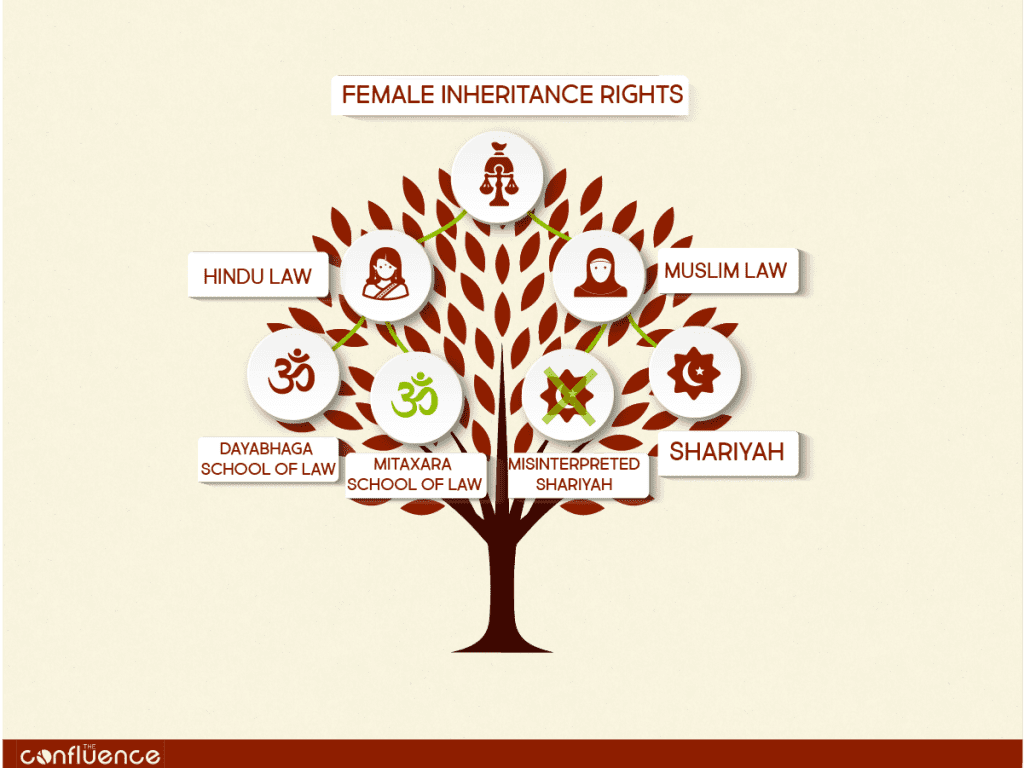“I had a very supportive relationship with my brothers. But soon the relationship escalated when my husband divorced me. I felt the necessity of my father’s property due to not having a stable income. Throughout my whole life I never asked for a penny from my father due to societal stigma; however, when I asked for my portion, my brothers refused to give me even 5 percent of my inheritance. Finally, I had to come to Dhaka without any networking support. Later on, I had to start working as a maid in the Mugda area.” mentioned Feroza Parvin, a 62 years old woman while grieving about not getting her ultimate land rights.
KEY TAKEAWAYS
- Bangladesh is yet to sign CEDAW in terms of female inheritance rights
- The misinterpretation of Sharia is the reason behind not changing the patriarchal laws which Tunisia, Egypt, Morocco already reinterpreted but Bangladesh could not.
- Stopping Fatwa with proper interpretation of Islamic laws can make a change
- An extensive change in the syllabus of Islamic Law in addition to solving the cases following the best interests is a significant step towards bringing gender equality.
Bangladesh is one of the first countries to sign CEDAW which specifically focuses on eliminating all forms of discrimination against women but with reservations on articles 2, 13(a), 16.1(c), and 16.1(f). The Ershad regime in 1984 declared that the equality in inheritance and property rights for women cannot be signed in CEDAW as it conflicts with Sharia law mentioned in the Holy Quran and Sunnah. A secular country where more than 10 percent of the population is non-muslim follows muslim Sharia law in terms of family laws. Even after years of a military autocratic regime of the Ershad regime, we have failed to work on the inheritance rights for women due to repeated religious fundamentalist attacks.
Some of the muslim majority countries such as Tunisia, Egypt, Morocco etc have already reformed the Sharia law in terms of ensuring women’s property rights. Why couldn’t Bangladesh then? In 2009, the Awami League government came into power they drafted the National Women Development Policy to ensure equal inheritance rights for women. However, it could not be documented due to the chaos coming from the biggest religious fundamentalist group Hefazat-e-Islam. Qawami Madrasas from all over the country, specifically from Chittagong came up with 13 points demands to abolish the draft as the inheritance law reform was anti-Islamic. Unfortunately the newly formed govt could not do much except for passing the laws regarding giving women full control over their acquired property.

On another note, the property rights given to Hindu women is limited to Stridhana, including the property women get from their father’s at the time of their marriage. At times if the women end up having no siblings they can not get the access to their own father’s property fully. Nisheta Das is in her junior year at the University of Dhaka, amid the high competition she survived the Dhaka University’s admission test and aspires to be a bureaucrat. The progressive world has given so much right into her plate to acquire but she can not access her inherited property once she gets married. “What’s the point of this Stridhana law which has been changed in India already?”
India in 1956 just after independence, reformed the inheritance law for women in such a way that women can get the access of their inherited property, bringing equality to her basic rights. Often the Hindu religious fundamentalists in Bangladesh end up blaming the government that minority rights are getting hurt when the civil society talks about reforms in Stridhana law. Unfortunately it is the patriarchal structure to suppress women which is using religion as a tool. If a country like India which promotes hinduism could reform the law why could not Bangladesh?
The case is the same for the muslims. If middle eastern countries could bring reforms, what is wrong with reforming a patriarchal law hiding in the name of Sharia? During the Mughal dynasty, the Bengal Subah has followed Islamic laws in family law as well as the administrative laws, akining to Islam. Soon after the British came into power, they changed every law in their favour to extract resources but they could not change the Family law like inheritance rights, divorce rights etc. During 1772, at the time of Warren Hastings, subtle progressive legal reforms were seen through early marriages, uprooting Satidaha Pratha etc. But the main objective of the British was to win popular support so they ended up not touching the family laws that much.
On the other hand, Islamic laws were translated during the British era from Arabic to English, eventually it does not show the proper interpretation of Sharia which talks about bringing justice for all. The minimum portion which should be given to the women was mentioned in Arabic but the patriarchy of interpreters made it look like the ultimate portion that women deserve in terms of property and inheritance. However, countries such as Tunisia and Egypt interpreted the Islamic laws again which broke the unequal power dynamics. Here’s the catch, as a majority muslim country with secular views, why are we ending up following the misinterpreted family laws under the tool of Sharia?
Taslima Yasmin, an Associate Professor of Law department of the University of Dhaka answered this, “This is a grey area of pluralism. When we talk about minorities rights we often forget that women are the minorities. Apart from reforming the patriarchal laws, it is social stigma and fear of lacking support from the paternal side which bugs a woman in Bangladesh to ask for their own father’s property.”
The social stigma that a woman is not supposed to take property from her father in order to protect her self respect always played a role in less concerns over reforming the inheritance laws. Even the educated females also end up considering thefather’s family as a backup shelter if they have to leave their husband’s house. In addition, the literacy rate is increasing but not in a way that women take the control of their household document papers. Fraudulence through papers is a very common practice coming from their brothers.
Whenever we talk about reforming the Islamic laws, we have failed as the law commission has mostly played quite a conservative role. At the same time, a group of religious fundamentalists end up giving the government the “Anti Islamic” tag whereas the true beauty of Islam lies in thinking from intellect to bring equality and justice.
“He grants wisdom to whoever He wills. And whoever is granted with wisdom is certainly blessed with a great privilege.But none will grasp the Message except the men of intellect.” [Quran 2:269]
Islam was never stagnant, will never be. It is the religious fundamentalist groups and distortion of Islamic laws by the British with their patriarchal mindset that still now bring chaos when we talk about equality.
However, it is not possible to reform the laws and social stigmas all of a sudden, small steps are necessary. “Monitoring and setting penalties can help whenever we see that the brothers are taking the route of fraudulence when the women are asking for their inherited property. Often the report goes under land laws which run for years. Rather than taking it under land laws only we need to take immediate actions under fraudulence as well.” Taslima Yasmin mentioned as per her suggestion regarding the injustice.
STOPPING FATWA in Wajj Mahfils
Mahfils with wrong interpretation of Islam should be done immediately. The religious leaders (Mollas) at root level end up abusing the trust of people which have to be stopped. While mentioning about reforms Arpeeta Shams Mizan, an Assistant Professor of Law department at the University of Dhaka said, “Eradicating the distortion of Sharia through misinterpretation is a necessity. On the other hand, the UGC and the Bar Council Legal Education Committee should consider including Islamic jurisprudence as part of Islamic law syllabus in universities.”
REINTERPRETING Islamic Laws
“When deciding cases that apply Islamic law such as inheritance, our courts should apply rules of interpretation under Islamic law as opposed to common law rules of interpretation, since sharia and common law follow different legal structures. The custody cases are solved by the court through considering the ‘best interest of the child principle.” Arpeeta mentioned.
In addition, the Islamic ways of bringing equality for women includes Wasiyah and Hiba that shortens the gaps in between men and women inheritors. Wasiyah and Hiba is more of a will system where a person can declare how his property is going to be distributed. But these two ways include spending a lot of money to ensure equal access for the daughters. No money schemes and government contribution in this aspect is necessary as an immediate implication for women inheritors.
Enacting Hindu Succession Act
The inheritance rights of Hindu citizens follow Dayabhaga school of Hindu law in Bangladesh whereas in India they follow Mitakshara school of Hindu law. These two schools are innovations of the British government to create a division. Despite following the Dayabhaga school, West Bengal incorporated Hindu Succession Act, 1956 which clearly mentions a uniform and comprehensive system of inheritance. It is time that we take a step for the minorities in our laws as well. In the end, it surely depends on the governments will and their priorities to bring reforms, smaller steps are already visible but we still have a long way to walk.
Picture– Feroza Parvin
About the Author

1 comment
[…] Nobel Prizes, and Equality Before… ChatGPT : Policy Challenges of Generative AI Models Female Inheritance Rights? Abducted by Patriarchal Laws! TCB’s Relief in Times of Crunch A modern regulatory regime for Bangladesh Smart Justice […]